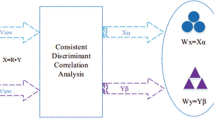Abstract
Hotelling’s Canonical Correlation Analysis (CCA) works with two sets of related variables, also called views, and its goal is to find their linear projections with maximal mutual correlation. CCA is most suitable for unsupervised feature extraction when given two views but it has been also long known that in supervised learning when there is only a single view of data given, the supervision signal (class-labels) can be given to CCA as the second view and CCA simply reduces to Fisher’s Linear Discriminant Analysis (LDA). However, it is unclear how to use this equivalence for extracting features from multiview data in semisupervised setting (i.e. what modification to the CCA mechanism could incorporate the class-labels along with the two views of the data when labels of some samples are unknown). In this paper, a CCA-based method supplemented by the essence of LDA is proposed for semi-supervised feature extraction from multiview data.
Access this chapter
Tax calculation will be finalised at checkout
Purchases are for personal use only
Preview
Unable to display preview. Download preview PDF.
Similar content being viewed by others
References
Fisher, R.A.: The Use of Multiple Measurements in Taxonomic Problems. Annals of Eugenics 7, 179–188 (1936)
Hotelling, H.: Relations between two sets of variates. Biometrika 28, 321–377 (1936)
Favorov, O.V., Ryder, D.: SINBAD: a neocortical mechanism for discovering environmental variables and regularities hidden in sensory input. Biological Cybernetics 90, 191–202 (2004)
Kettenring, J.R.: Canonical analysis of several sets of variables. Biometrika 58, 433–451 (1971)
Bartlett, M.S.: Further aspects of the theory of multiple regression. Proc. Camb. Philos. Soc. 34, 33–40 (1938)
Hardoon, D., Szedmak, S., Shawe-Taylor, J.: Canonical correlation analysis: an overview with application to learning methods. Neural Computation 16, 2639–2664 (2004)
Alpaydin, E.: Introduction to Machine Learning (Adaptive Computation and Machine Learning Series). The MIT Press, Cambridge (2004)
Loog, M., van Ginneken, B., Duin, R.P.W.: Dimensionality reduction of image features using the canonical contextual correlation projection. Pattern Recognition 38, 2409–2418 (2005)
Barker, M., Rayens, W.: Partial least squares for discrimination. Journal of Chemometrics 17, 166–173 (2003)
Sun, T., Chen, S.: Class label versus sample label-based CCA. Applied Mathematics and Computation 185, 272–283 (2007)
van Breukelen, M., Duin, R.P.W., Tax, D.M.J., den Hartog, J.E.: Handwritten digit recognition by combined classifiers. Kybernetika 34(4), 381–386 (1998)
Asuncion, A., Newman, D.J.: UCI Machine Learning Repository. University of California, Department of Information and Computer Science, Irvine (2007)
Borga, M.: Learning Multidimensional signal processing, PhD thesis, Department of Electrical Engineering, Linköping University, Linköping, Sweden (1998)
Hsu, C.W., Lin, C.J.: A Comparison of Methods for Multi-Class Support Vector Machines. IEEE Trans. Neural Networks 13, 415–425 (2002)
Author information
Authors and Affiliations
Editor information
Editors and Affiliations
Rights and permissions
Copyright information
© 2010 Springer-Verlag Berlin Heidelberg
About this paper
Cite this paper
Kursun, O., Alpaydin, E. (2010). Canonical Correlation Analysis for Multiview Semisupervised Feature Extraction. In: Rutkowski, L., Scherer, R., Tadeusiewicz, R., Zadeh, L.A., Zurada, J.M. (eds) Artificial Intelligence and Soft Computing. ICAISC 2010. Lecture Notes in Computer Science(), vol 6113. Springer, Berlin, Heidelberg. https://doi.org/10.1007/978-3-642-13208-7_54
Download citation
DOI: https://doi.org/10.1007/978-3-642-13208-7_54
Publisher Name: Springer, Berlin, Heidelberg
Print ISBN: 978-3-642-13207-0
Online ISBN: 978-3-642-13208-7
eBook Packages: Computer ScienceComputer Science (R0)




